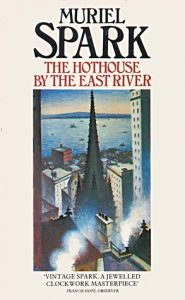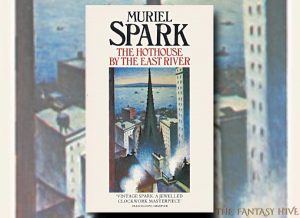THE HOTHOUSE BY THE EAST RIVER by Muriel Spark (BOOK REVIEW)
“There isn’t any war and peace any more, no good and evil, no communism, no capitalism, no fascism. There’s one area of conflict left and that’s between absurdity and intelligence.”
Muriel Spark is a Scottish writer best known for her iconic novel The Prime of Miss Jean Brodie (1961), but from her debut novel The Comforters (1957), in which protagonist Caroline Rose becomes aware that she might be a fictional character in a novel, she has played with strange, uncanny and metafictional elements in her work. Her 1973 novel The Hothouse by the East River is a masterpiece of the strange, a wonderful surrealist work in which the only rational response to the trauma of life after World War II is, to paraphrase Philip K. Dick, if not to go insane than to embrace irrationality. Spark’s novel is a powerful and disconcerting work that explores intermediate and indeterminate states of being as effectively and as imaginatively as anything by PKD.
 Paul and Elsa used to work for the English secret service during World War II, but now it is the 1970s and they are retired and living in New York. Their daughter Katerina is always short of money, whilst their son Pierre is putting on a performance of Peter Pan with geriatric actors. Elsa is becoming increasingly dependent on her psychiatrist Garven, and Paul is doubting her sanity. This is made worse by the fact that her shadow always seems to point in the wrong direction. When Elsa believes that she has seen Helmut Kiel, a German ex-Prisoner of War and her former lover who died years ago, working at a shoe shop, Paul becomes convinced that Kiel is going to kill the both of them. Events get stranger and stranger, as Elsa and Paul’s grip on reality starts to disintegrate, much to Garven’s fascination and Pierre and Katerina’s frustration. Did Kiel die during the war, or did he fake his own death and is now seeking revenge? Or, as more and more of Elsa and Paul’s traumatic memories from the war are revealed, was it Elsa and Paul who did not survive?
Paul and Elsa used to work for the English secret service during World War II, but now it is the 1970s and they are retired and living in New York. Their daughter Katerina is always short of money, whilst their son Pierre is putting on a performance of Peter Pan with geriatric actors. Elsa is becoming increasingly dependent on her psychiatrist Garven, and Paul is doubting her sanity. This is made worse by the fact that her shadow always seems to point in the wrong direction. When Elsa believes that she has seen Helmut Kiel, a German ex-Prisoner of War and her former lover who died years ago, working at a shoe shop, Paul becomes convinced that Kiel is going to kill the both of them. Events get stranger and stranger, as Elsa and Paul’s grip on reality starts to disintegrate, much to Garven’s fascination and Pierre and Katerina’s frustration. Did Kiel die during the war, or did he fake his own death and is now seeking revenge? Or, as more and more of Elsa and Paul’s traumatic memories from the war are revealed, was it Elsa and Paul who did not survive?
The Hothouse by the East River is a vivid and disconcerting exploration of the physical and mental trauma suffered by those who lived through World War II. Elsa and Paul exist in a mental state in which the traditional values and worldview that they grew up with has been displaced by the violence of global war and the technological horrors of the Holocaust and the atomic bomb. Caught between an idealised past, as symbolised by Pierre’s production of Peter Pan, an imaginary childhood wonderland accessible only by those born before the war, and a deeply uncertain future, they are unable to cope with the modern world as it exists in front of them. Elsa takes refuge in psychiatry, whilst Paul succumbs to paranoia. However these can only ever be temporary escapes in a world that fundamentally refuses to make sense.
Spark’s novel is split between scenes set in the present day, in which Paul desperately tries to maintain a veneer of normality as Elsa gives in to the chaos, and those set during the war in England, where Paul and Elsa’s initial courtship takes place against the backdrop of a secret service camp where German ex-POWs are working with the English to help defeat Nazi Germany. The world of the wartime secret agent is one of paranoia and conspiracy, and in this case things are further complicated by Elsa’s affair with Kiel. Much of the novel takes place in the spaces between events, in Elsa’s routine walks around the compound with the ex-POWs, or in interrogation rooms as the bureaucracy that supports the war effort takes place. This is contrasted with the limbo-like existence of Paul and Elsa in the present day, where they drift between dinner parties and nights out with friends, all of which begins to seem increasingly unreal and frivolous. As events get more and more bizarre, the whole novel begins to take on the aspect of a bad dream.
Spark has an excellent way with character and dialogue, which she mines for both comedy and pathos. As proceedings get ever more surreal and absurd, she never loses sight of Paul and Elsa as characters. Though they may be paranoid and self-absorbed, there is a real sense of tragedy in the way they are on the run from a reality they no longer understand, haunted by a past they cannot accept. The Hothouse by the East River demonstrates how a turn to the absurd and irrational can sometimes be necessary in order to survive. This is a message that feels increasingly relevant in these bizarre and uncertain times.

